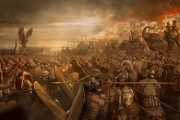What Do Great Leaders Have in Common?
From ancient leaders, the likes of Alexander the Great, Hannibal Barca, Jesus of Nazareth... to Martin Luther King, Ghandi, Bill Gates... what do all great leaders have in common?

According to recent research, 80% of leaders today fail to impress in their first 2 years in their leadership roles... 70% admit to be incredibly stressed... Over 70% admit to not enjoying the job...
Terrifying numbers that got me thinking and wondering what is it that makes a leader successful or great... what is or are the common denominator or key factors. One thing is for sure and contrarily to popular belief, great leadership is not IQ. In fact, success is not IQ either. It is an entry point, it certainly helps, but is not the main factor.
To solve the mystery, I decided to select and study a number of great leaders throughout history, from different eras and different categories. Renowned names such as Alexander the Great, Hannibal Barca, Jesus of Nazareth (the man), Martin Luther King, Ghandi, Henry Ford, Bill Gates, Steve Jobs...
And as a result, I discovered three common key denominators that are fundamental and central for the success of any leader .
In the way that I have perceived them, these three common denominators are distributed on three main dimensions: self-perception, interpersonal awareness and logical realization.
1 Self-Perception Obsession with the Idea, Purpose or Vision
Self-Perception is related to the ethos of the leader. It is how he perceives himself and the outside world from a spiritual point of view. After his spiritual awakening, he forms or borrows the vision that will be the destination of his leadership campaign.
Yet it's not sufficient to merely have a vision... nor is it enough to just believe in it... he needs to be possessed by that vision. That what set apart these great leaders; they lost theirselves in the idea and the prize, they lived and breathed that vision day in and day out.
The leader is the most committed, most determined, most confident, most concentrated. He is who makes the most of the sacrifices and takes the first initiatives. With the eye on the prize, everyday a leader recharges his powers, and although it is a difficult journey ahead, he still finds the will to carry on and succeed.
"Be obsessed or be average" - Grant Cardone
Hannibal Barca was obsessed with taking the Romans down, how many times have we read that a character was possessed of “a hatred like Hannibal’s” or that “he hated with the intensity of Hannibal”? That was his lifetime obsession and a purpose that he sacrificed his life for. Alexander the Great was obsessed with self-glory and conquering Persia to avenge the Persian invasion of Greece and destruction of Greek temples.

"I will either find a way, or make one." Hannibal Barca
Modern time leaders are also obsessed. We all know Steve Job's obsession with perfection and with the customer's experience, which to most, was the disruptive dark side of his triumphs. Meanwhile, Bill Gates was, since young age, captivated by computers and spent years working from his garage, developing coding and programming, and learning how to create a solution with global reach. This took seemingly endless hours.
2 Interpersonal Awareness Influence & Persuasion - Recruiting the Followers
Before all else, a leader is a person who leads or guides other individuals, teams, organizations or an entire nation. In the light of that, dealing with people is inevitable.
The first task of a leader, in his contact with outside world, is to unveil and unfurl his vision. And the second one is to influence, persuade and transfer his eagerness to others. Great leaders understand that there is more power when more than one are working for the same purpose.
"Leaders don't create followers, they create more leaders." Tom Peters
Regardless of the manner of persuasion, whether it is the extraordinarity of the vision, the charisma of the leader, his empathy and soft skills, his logical appeal... a leader must find the way that appeals to other people’s sense of purpose. The appeal would be as the following: "Well here’s what’s in it for me, and here’s what’s in it for you. And here’s why the two of us together can further the enterprise and further what’s in it for you and further what’s in it for me."

The Art of Empathy
Jesus mastered empathy, he understood the spiritual needs of the crowd and he knew how to appeal to them to deliver the message. He also trained disciples whom he chose to be “with him”. He taught them and also gave them assignments. However, he also shared with them his daily life.
Alexander capitalized on the eagerness for vengeance and glory residing within his greek compatriots to fulfill his plan. He created a very astute propaganda machine to keep his people engaged. His oratory skills, based on the simple language of his soldiers, had a hypnotic influence on all who heard him. He made extensive use of powerful cultural symbols which elicited strong emotions. These ‘meaning-management’ actions, combined with his talent for leading by example, fostered strong group identification among his troops, and motivated his men to make exceptional efforts.
On the other hand, Hannibal was miraculously able to keep together his multi-ethnic army of mercenaries, made of Africans, Iberians, Celts, and various Italians, with little commonalities. One of the keys of his success was his ability to gain and retain the trust of his troops.
"Coming together is a beginning, staying together is progress, and working together is success." - Henry Ford
In the modern business world, Henry Ford embodied the emotional intelligence quality before the term was even coined. His ability to understand that saving clients money made them feel more valued was a sure sign of emotional intelligence. He was sensitive to economic needs and took action to respond to customers in ways that showed he cared. Similarly, he was in-tune with the financial and work life balance needs of employees. Because he hoped to show appreciation and understanding toward them, he implemented positive wage and shift changes. Ford even said “If there is any one secret of success, it lies in the ability to get the other person’s point of view and see things from that person’s angle, as well as your own.”
3Logical RealizationStrategic Awareness - Day to Day Implementation
What is Strategic Awareness
Strategic awareness is the fusion of strategic thinking and personal awareness. It is the process of accessing information and incorporating awareness or inner knowing into the strategic decision-making process.
Strategic opportunities exist all around us, often through the information people carry with them. Capitalizing on these opportunities requires you to be more alert and attentive to what is happening in the world around you. In doing this you are more prepared to gather and evaluate the information you are receiving.
“A vision without a strategy remains an illusion.” — Lee Bolman.
In business, this can involve looking at external trends in the global marketplace, (political, economic, social or other) and analyzing its potential impact on your organization and its internal decision-making.
All great leaders have Strategic Awareness
What I found is that all great leaders possess this characteristic. It is not simply IQ or logic - Henry Ford had low IQ - but also information gathering, data analysis and deep understanding of the surrounding, in order to put together the pieces of the logical plan.
All great leaders excel in strategic planning. They constantly do a strategic mental rehearsal. They have all imagined reaching the goal in their mind, they have imagined the steps on the way, and they've probably done it 10 or 20 times. A leader's philosophy would be as: "I know where I am going but I need to know how to implement that in the here and now and make whatever course correction that are necessary."

If we take Martin Luther King Jr. as an example, the key for his success was his adaptable and flexible strategy in line with the surrounding events. He constantly changed his tactics to fit the changes happening around. He stayed focused on the overall goal, but one week he would compromise on the attacks in the march across the Edmund Pettus Bridge in Selma, the next he would get himself put in jail to push something.
“A flexible strategy is a crucial element of your success as a leader.” –Joe Scherrer
On the other hand, what made Hannibal, Alexander and Julius Caesar the masters of command and the greatest generals of ancient times, were their strategic and tactical abilities. Their strategic awareness allowed them to not only know their own army, but also explore the adversary's strengths and weaknesses, and take advantage of the terrain and surrounding factors.
The Art of Strategic Planning and Implementation
I can't hide my admiration for Hannibal Barca. Hannibal had a brilliant mind for tactics. He used the terrain and the weaknesses of the enemy to defeat the superior Roman forces. Over and over again, he was able to find the enemy’s weakest point, and throw his strongest forces against it to win the day. His battles are famous in world history, and for good reason. From Lake Trasimene, where in an unparalleled feat he hid his entire army and ambushed the Romans, to Cannae, where he executed a double envelopment of the Romans opposing him, a feat which generations of generals have tried to replicate.
Ghandi was a reasonable strategist. He had an amazing public relations network and a very good relationship with the press then. For instance, the Dandi march, if Gandhi had gone there quietly, it would just not have made an impact. He knew he had to create an event to make an impact and so he took his followers on a march that stirred the popular imagination of the time. He had a total understanding of the human psychology and used it to build his tactics.
The Art of Decision Making
Naturally, when you are in a leadership position, it is you who carry the burden of making the decisions. Although that most of the time, the leader's decision would be based on his strategic awareness, many times he would need to rely on his interpersonal empathy discussed in point 2.
And that may force the leaders to take fast strategic decisions. Your job as a leader isn't always to make the right decision, but it's to make a decision in order to keep the team together. Wrong decisions could be fixed but a scattered team is a recipe for disaster. Yet, once a wrong decision is taken, it has to and should be fixed. Focusing on the overall goal, the leader make course corrections along the way.
Once again the leader keeps his eye on the prize, letting go of his ego, making the necessary sacrifices, as he is aware of the power of a united group to serve the supreme purpose...
Keeping Your Tradeshow Relevant in the Future
This article is heavily based on Francis J. Friedman's "The Modern Digital Tradeshow", that can be downloaded for free on...
How to Deal With An Incompetent Boss
An incompetent boss can seriously damage or derail your career, how to handle him/her?
You Need Empathy to Thrive in Business
Why empathy is a crucial skill that you need in order to achieve extreme performance.















